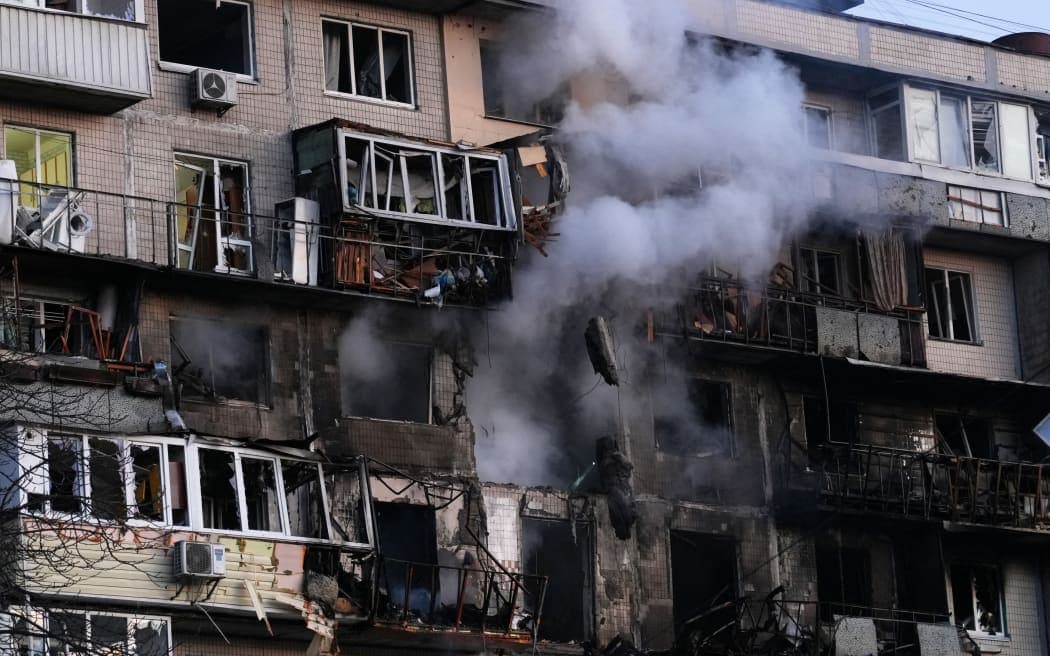We're loading the full news article for you. This includes the article content, images, author information, and related articles.
An escalation in the Russia-Ukraine conflict sees dozens killed and injured in Kyiv, while a retaliatory strike on a major Russian oil export hub sparks fears of fresh volatility in global energy markets, with potential ripple effects for Kenyan consumers.

A devastating wave of Russian airstrikes pounded the Ukrainian capital, Kyiv, overnight on Friday, November 14, 2025, killing at least six people and injuring dozens more as drones and missiles slammed into residential buildings. The attack, described by Ukrainian President Volodymyr Zelenskyy as a "wicked" and "calculated" assault, involved approximately 430 drones and 18 missiles, targeting civilian areas and energy infrastructure.
Emergency services scrambled across the city as reports of explosions and fires emerged from at least nine districts. A nine-story apartment building in the Desnianskyi district bore the brunt of one strike, where all six fatalities were recorded. According to Kyiv's military administration head, Tymur Tkachenko, at least 34 people were injured across the city, including two children and a pregnant woman. Debris from a Russian Iskander missile also damaged the Azerbaijani embassy, prompting a formal protest from Azerbaijan to Moscow.
In a swift and significant response, Ukraine launched its own long-range attacks on Russian territory. President Zelenskyy confirmed the use of Ukrainian-developed "Long Neptune" cruise missiles, targeting key Russian infrastructure. The most impactful of these strikes hit the Black Sea port of Novorossiysk, a critical hub for Russian oil exports.
The attack targeted the Sheskharis oil terminal, one of the largest oil loading complexes in southern Russia, sparking large fires and forcing a temporary suspension of oil exports. Russian state pipeline operator Transneft halted the pumping of crude to the port, according to industry sources cited by Reuters. The Novorossiysk terminal handles up to 2.2 million barrels per day, accounting for roughly 2% of the global oil supply. The disruption immediately sent ripples through global markets, with Brent crude futures rising by over 2% on fears of supply disruption.
While the conflict is geographically distant, its economic shockwaves have consistently been felt in Kenya. The latest escalation and its impact on oil prices are a cause for concern. Any sustained increase in global crude prices inevitably translates to higher fuel costs at the pump for Kenyans, driving up the cost of transport and production for businesses and squeezing household budgets. As of the latest review on Friday, November 14, 2025, the Energy and Petroleum Regulatory Authority (EPRA) announced that fuel prices in Nairobi would remain unchanged for the next month, with Super Petrol at KSh 184.52, Diesel at KSh 171.47, and Kerosene at KSh 154.78. However, market volatility stemming from the Novorossiysk attack could pressure these prices in future reviews.
The war also continues to affect food security. Kenya is a significant importer of wheat from both Ukraine and Russia. While a UN-brokered grain deal previously ensured passage for Ukrainian grain, its collapse and the ongoing conflict create uncertainty for future supplies and prices of essential commodities like bread and flour. In 2023, Ukrainian President Volodymyr Zelensky announced plans to establish a "grain hub" in Mombasa to help combat food insecurity in the region, though details remain pending.
Adding a direct human dimension to the conflict, Kenya's government recently confirmed that over 200 of its nationals have been recruited to fight for Russian forces, often lured by deceptive job offers. Prime Cabinet Secretary Musalia Mudavadi's office stated on Wednesday, November 12, 2025, that recruitment networks remain active, a situation he described as "extremely worrying." President William Ruto has engaged diplomatically with President Zelenskyy to request the release of any Kenyans detained in the conflict zone.
As both sides intensify their long-range strike capabilities, the potential for wider economic and geopolitical disruption remains high. For Kenya, the immediate concerns are the stability of fuel prices and the continued, affordable supply of essential grains, alongside the welfare of its citizens drawn into the distant war.
Keep the conversation in one place—threads here stay linked to the story and in the forums.
Sign in to start a discussion
Start a conversation about this story and keep it linked here.
Other hot threads
E-sports and Gaming Community in Kenya
Active 9 months ago
The Role of Technology in Modern Agriculture (AgriTech)
Active 9 months ago
Popular Recreational Activities Across Counties
Active 9 months ago
Investing in Youth Sports Development Programs
Active 9 months ago